While still gathering the courage to ask a friend out on a date... it'll probably never happen.
In the latest news of the human relationship dynamic (females in case the gender matters, and it probably does), I have these two friends who are also friends with each other. Lately, I don't get to talk to them together but I do manage to chat with them independently on occassion.
Of course what I found peculiar is how each one is acting like a big sister and telling me how I'm screwing things up when talking to the other friend.
The me of four years ago will probably complain about how I'm hearing about my faults from the other person, and wishing that the person themselves would tell me directly what's wrong so that I don't have to wait for the other friend to give me feedback before I correct myself (because you know, I'm simple, dense, and direct).
The me of the present knows how futile it is to expect such things, so I'll just have to work with what I have, and investigate how I can have a similar "attachment" to all my female friends, so that their new companion can tell me what I'm doing wrong and vice versa. (Or finding their hidden locked posts on livejournal or vox or whatever secret blog they have will have to do).
Friday, October 27, 2006
Phases
Kinda like a long-term mood swing, I operate in phases that usually has no relation with the previous phase. Since most of the blog entries have stopped, the reader/writer phase has gone and has been replaced with the pen-and-paper RPG phase, although it's not like I'm playing D&D nowadays (if only someone would run a D&D game...).
And as much as I want to join up for this year's NaNoWriMo challenge, I'll have to pass as there's so much non-novel writing that needs to be written, blog entries included.
And as much as I want to join up for this year's NaNoWriMo challenge, I'll have to pass as there's so much non-novel writing that needs to be written, blog entries included.
Collective Nouns
Apparently, that's the term for words included in statements like a murder of crows, a crash of rhinos (ah, Magic: The Gathering, is there nothing you do not teach?).
You can visit The Collective Noun Page for an unofficial list. One of the more speculative ones include an anthology of prostitutes ("Hey, we should come up with an anthology!" "Of writers? Or prostitutes? Either way's fine...").
You can visit The Collective Noun Page for an unofficial list. One of the more speculative ones include an anthology of prostitutes ("Hey, we should come up with an anthology!" "Of writers? Or prostitutes? Either way's fine...").
Mabuhay Doctor
Just plugging fashion guru Jenni Epperson's blog, Mabuhay Doctor over at Multiply. I was supposed to teach her how to blog, but genius that she is, managed to figure it out for herself. This is probably the wrong audience for it but for all your fashion, beauty, and shopping needs, drop by and join one of her contests (or just look at her fancy photos).
It's Been So Long...
...since I apparently last updated.
As for updates on life, work has been quasi-busy, mainly because the boss is off on his vacation, and that's really a double-edged sword. A blessing mainly because there's no one to look around your shoulder so there's less tension in the office (because we get the work done anyway even if no one is looking), but a big challenge as well as there'll only be certain decisions he can make, and no one will be approving future bills.
There's a big sigh of relief on my part that this year's The Philippines Yearbook has been released, but there are still three other magazines to work on...
As for updates on life, work has been quasi-busy, mainly because the boss is off on his vacation, and that's really a double-edged sword. A blessing mainly because there's no one to look around your shoulder so there's less tension in the office (because we get the work done anyway even if no one is looking), but a big challenge as well as there'll only be certain decisions he can make, and no one will be approving future bills.
There's a big sigh of relief on my part that this year's The Philippines Yearbook has been released, but there are still three other magazines to work on...
Monday, October 23, 2006
Scary
It doesn't happen too often but a source of emotional distress for me is pondering on asking a friend if I could court her (no, it's not anyone you know, and right now there's only one person who reads my blog who's acquainted with the person, but it's obviously not who you might think). If the gambit fails, I doubt if the relationship can return to what it once was. And even if it does succeed, the dynamic of the relationship changes as well. But if I never ask the question, the relationship can never move forward (as I'm doing all the initiating). I'm just caught in the web of procatination, making the excuse of "finding the right time", which most of you should realize by now, will most likely never occur unless you yourself creates the scenario.
Lethargy
Occassionally, I will be struck with such laziness and inefficiency that I will get nothing done. No books read, no writing done, and I break off communication with the rest of the world (which is quite easy because no one really calls unless it's a chain-letter text message or they need something).
The past week was one of those days, which will explain much of the inactivity.
Today's agenda is an interesting one as I start out with a photo shoot in the morning, and end with a book launch in the evening. I'll be expecting Murphy's Law to kick in during those vital moments, throwing my lifeless husk into chaos. To give you an idea how wrong things can go, last year's book launch involved the circulation manager getting drunk on wine and punching my boss.
The past week was one of those days, which will explain much of the inactivity.
Today's agenda is an interesting one as I start out with a photo shoot in the morning, and end with a book launch in the evening. I'll be expecting Murphy's Law to kick in during those vital moments, throwing my lifeless husk into chaos. To give you an idea how wrong things can go, last year's book launch involved the circulation manager getting drunk on wine and punching my boss.
Thursday, October 19, 2006
Gaming Blog
Some members of the informal group Cult of Tin (it's a private joke) last week told me to get a Vox account if it was just the new features of Blogger Beta that I was interested in. Signed up last week but it was only early this week that I received an invite (yes, I have several friends from livejournal who have spare invites to spread around but I didn't want to impose) so yes, I have another blog.
While I figure out how to use the various options of Vox, in the meantime it'll be used as a gaming blog. I have three posts already there and for the time being, it'll be centered mostly on Dungeons & Dragons but in the future who knows? L5R, GURPS, and other pen-and-paper RPGs are a possibility. I might even do a comprehensive guide to DotA or something.
In the meantime, D&D gamers visit. Those who aren't familiar with the game will get uncomfortable as I throw jargon after jargon. It's surprising though how bold and italic faces can make reading a whole lot easier.
While I figure out how to use the various options of Vox, in the meantime it'll be used as a gaming blog. I have three posts already there and for the time being, it'll be centered mostly on Dungeons & Dragons but in the future who knows? L5R, GURPS, and other pen-and-paper RPGs are a possibility. I might even do a comprehensive guide to DotA or something.
In the meantime, D&D gamers visit. Those who aren't familiar with the game will get uncomfortable as I throw jargon after jargon. It's surprising though how bold and italic faces can make reading a whole lot easier.
Wednesday, October 18, 2006
The Black Jewels Trilogy by Anne Bishop
Anne Bishop's Black Jewels Trilogy is an interesting animal. On one hand, it can be quite dark and amoral (the darkness is worshipped for example). However, it's not really as visually graphic or as mature as say, Jacqueline Carey's Kushiel series. On the other hand, it's pop bordering along the lines of David Eddings and Mercedes Lackey fare storytelling, with occassional wish-fulfillment and stupid evil overlords creeping in at times. I will give credit though to Bishop for creating a challenging concept and executing it successfully. Her writing style is fairly easy to understand and is as consumable as any fantasy-pop novel like R.A. Salvatore or Terry Brooks. The mood is quite dark despite the use of a child protagonist, but on the other hand the characters can be quite kind and innocent at times, despite them being the keepers of Hell or the boytoy of several queens. Those blindly following their pastors preachings should avoid this book, but paradoxically it's not as dark as some of the other fantasy series's out there. Bishop doesn't score any bonus points in the description department as it's pretty much standard fare, although I am impressed at how many times she manages to avoid saying the word penis. It can best be summed up as a romance of sorts with magic and mystical creatures thrown into the mix. What also throws me off is how Bishop ends each book, not quite comic cliffhanger, but not fully resolved either. The Black Jewels is half-part dark, half-part pop-friendly. I expect it'll be a guilty pleasure for a lot of people, at the very least for the deviants within each one of us.
The Last Hero by Terry Pratchett
Terry Pratchett's The Last Hero is one of those books that while it works without the illustrations, you'll be missing out a lot on Paul Kidby's fabulous Discworld art. The book follows the trail of several popular Discworld characters and this is the closest you'll get to a world-splanning crossover. There's no real villain in the story, simply lots of good guys working on opposite ends. As typical of a Discworld novel, Pratchett pokes fun at the convention of fantasy and what makes a hero a hero. Comedy aside though, the book contains depth and at the end of all this, the one thing I can promise you is that at least one character comes out of it more mature. Pratchett is a fine example that comedy and fun doesn't have to mean a story can't be meaningful or deep.
The Girl Who Played Go by Shan Sa
Another of those blind-buys, The Girl Who Played Go is both a romance and coming-of-age book, but its Eastern roots are quite evident in the sense that it's starkly different compared to how a Western writer would write it. The book constantly juxataposes between two characters, a Chinese girl and a Japanese soldier invading China. As can be expected, love develops between the two, but not in the way most readers might expect. It's all indirect, subtle, and even innocent. Throw in a background of historical conflict and you have an unparalleled story. I'm not a real fan of romance but exposure to writers like Shan Sa are a welcome deviation from my reading norm. Thankfully, Asian romance isn't necessarily mushy, but this book leaves you this feeling of catharsis by the time you're done.
The Changeling Sea
What I'm impressed about McKillip is how she can keep her stories short but entertaining, deep but simple, descriptive but appropriate. The Changeling Sea is such a book and while it's barely more than a hundred pages, she makes full use of the pages she's allotted. McKillip's focus are usually her characters and this isn't any different as they have the right mix of virtues and hubris. As most McKillip novels, The Changeling Sea can be passed off for a young adult book because she uses simple words and short sentences, but they're quite enthralling and vivid. The book's a bit more straightforward than others and less winded but that's not necessarily bad. It has this fairy tale type of feel that only the best writers can successfully pull off. The Changeling Sea is a good introduction to McKillip's writing style and with little investment in time.
Shadow of the Giant by Orson Scott Card
It's amazing how a series can change in focus over the series of a few books. That's the case with Shadow of the Giant, the latest book in the Ender's Shadow series. Political is the best way to describe it, as our protagonist, Bean, has lost his nemesis in the previous book and all that seems left is to tie up loose ends. Card has an interesting theory on war and on unity, and it's best voiced by the characters of this novel. Is it an interesting read? Yes. Are the characters still interesting? Yes again. But the conflict of the story has shifted from something personal to something bigger, to something more global. For people who've followed the series so far, it's a reward. For those who haven't, checked out Card's famous novel, Ender's Game first.
The Iron Dragon's Daughter by Michael Swanwick
If at first you don't succeed, try again. That's how I managed to finish reading Swanwick's The Iron Dragon's Daughter although the second time around, it wasn't as dragging as I thought it would be. At the time, Swanwick's novel blended modern machinery with the fantastical so his concept of an "iron dragon" was quite revolutionary. Steampunk but not quite. Mixed up in this bizzarre world is our female protagonist who seems to be trapped in a recurring world and her defiant stance at everything. Manipulation and sex abound, and Swanwick carves out an interesting narrative. Admittedly, there are lulls while reading the novel but the protagonist's exploits and emotions keeps you returning, if only to find out how it all ends. Halfway through the book, things start to get quite bizzarre, more so by the end. The Iron Dragon's Daughter is quite a slipstream novel, crossing several boundaries and presenting them in an unprecedented way. Not the easiest of reads, nor is it for pop consumption, but the journey is quite an experience.
The Etched City by KJ Bishop
I've heard praises about KJ Bishop and I must say she lives up to her reputation. The Etched City begins in a seemingly-modern setting revolving around two central characters. Midway through the novel, however, the book's true colors show as smatterings of the imaginary, the unreal start popping up. By the end of the book, you have this truly speculative tale with stories-within-stories. The descriptions are vivid without getting dragging (a problem with Anne Rice) and imaginative as she constantly mixes the mystical with the mundane. I didn't expect I'd be captivated by a book that was set in the real world but apparently it did. Her characters are equally interesting, especially the two protagonists, one an optimistic physician, the other an anti-hero of sorts. The Etched City isn't your pop-fare type of book, but it's not too high-brow as well, but it does challenge your imagination. For the right mix of fiction and entertainment, you might want to give Bishop a chance.
Waiting by Ha Jin
Occassionally, I'd blindly pick up a book just so I don't end up reading the same type of books over and over again. I gave Waiting a chance as it belonged to Vintage's line of Asian authors. What's evident about the novel is how Ha Jin's writing style is starkly different from Western authors. The story begins in medias res and we witness the love story (or lack of it) of a reluctant man. As can be derived from the title, the theme of the novel is waiting, and it recurs throughout the entire book, even getting philosophical at times. While the text is relatively easy to read, the subject matter can get dragging at times, even if the novel really isn't that long. Waiting is a very peculiar love story and while it's not a book I'll read again, I can't say that buying it was a waste of money.
Anansi Boys by Neil Gaiman
Anansi Boys for me can best be described as Gaiman's latest attempt to write a novel-length comedy and achieves mediocre success at best. It's not his first attempt to do so as he did an excellent collaboration with Terry Pratchett on Good Omens, but the comedy of this book seems like Terry Pratchett's style (minus the footnotes) with less of a bang. That's not to say that there aren't funny parts, but they're rather low-key and not the laugh-out-loud type. Thankfully, Gaiman is nonetheless a good writer, period, which is why Anansi Boys isn't simply a punchline type of book. The plot is interesting, and more so the characters. Drawing from African folk lore, among other sources, Anansi Boys has just that right mix of mythical and modernity plus shreds of pop culture and literature (K, anyone?) references. Overall not a bad book but it's also far from Gaiman's best work.
Apple's War on Windows
I know Apple didn't intend it but apparently less than 1% of Video iPods came with the RavMonE virus. While it's not detrimental to Mac, it is for Windows-operated computers.
On a related note, McDonalds/Coca-cola branded mp3 players in Japan come with a trojan worm, so viruses preloaded into your mp3 player might be the latest trend in propagating malware.
From: Engadget
On a related note, McDonalds/Coca-cola branded mp3 players in Japan come with a trojan worm, so viruses preloaded into your mp3 player might be the latest trend in propagating malware.
From: Engadget
PHILIPPINE PEN NATIONAL CONFERENCE
PHILIPPINE PEN NATIONAL CONFERENCE
25 November 2006, Saturday
UST St. Thomas Aquinas Research Center
Espana avenue, Manila
“THE ETHICS OF WRITING”
Opening Remarks: Alejandro Roces
Introduction of Keynote Speaker: Teresita Erestain
Keynote Address: Azucena Grajo Uranza
“Literature and the New Media”
Chair: Lito Zulueta
Panelists: Dean Francis Alfar, Ian Casocot, Khavn de la Cruz, Marjorie Evasco,
Vim Nadera, Ambeth Ocampo, Charlson Ong
The Jose Rizal Lecture .
Lecturer: Eugenia Duran Apostol
“Literature and Human Freedom”
Chair: Domingo Landicho
Panelists: Boni Ilagan, Malou Jacob, Susan Lara, Danton Remoto, Paz Verdadero Santos
“Literature in a Time of Repression”
Chair: Bienvenido Lumbera
Panelists: Sheila Coronel, Rosario Cruz Lucero, Axel Pinpin, Jun Cruz Reyes, Luis Teodoro, Jose Victor Torres
Conference Coordinator: Elmer A. Ordonez
From: Dean Alfar
25 November 2006, Saturday
UST St. Thomas Aquinas Research Center
Espana avenue, Manila
“THE ETHICS OF WRITING”
Opening Remarks: Alejandro Roces
Introduction of Keynote Speaker: Teresita Erestain
Keynote Address: Azucena Grajo Uranza
“Literature and the New Media”
Chair: Lito Zulueta
Panelists: Dean Francis Alfar, Ian Casocot, Khavn de la Cruz, Marjorie Evasco,
Vim Nadera, Ambeth Ocampo, Charlson Ong
The Jose Rizal Lecture .
Lecturer: Eugenia Duran Apostol
“Literature and Human Freedom”
Chair: Domingo Landicho
Panelists: Boni Ilagan, Malou Jacob, Susan Lara, Danton Remoto, Paz Verdadero Santos
“Literature in a Time of Repression”
Chair: Bienvenido Lumbera
Panelists: Sheila Coronel, Rosario Cruz Lucero, Axel Pinpin, Jun Cruz Reyes, Luis Teodoro, Jose Victor Torres
Conference Coordinator: Elmer A. Ordonez
From: Dean Alfar
Tuesday, October 17, 2006
Anime Anime
A few months back I've started watching anime again, mainly because I'm downloading videos for friends and it'd be ironic if I didn't get to watch the shows. Anyway, here are two anime shows that has a special place in my heart.
The first is Martian Successor Nadesico, a show from the late 90's. It's not the first time I've heard of the show but it's only lately did I get to watch the series in its entirety. What appeals to me is its post-modern take on the mecha genre. Aside from the anime-within-an-anime (Gekiganger 3), the plot and pacing draws upon two decades of anime and makes a parody of it. The resolution of the TV series is also priceless, a stark contrast to how similar shows end. Even character death is handled very differently, everything from anti-climatic to seemingly meaningless (but every death has a meaning). Suffice to say, Nadesico is a meta-anime. Or if you've been trapped in a cave for the past two decades, just enjoy it for sheer pleasure.
The other series which I'm engrossed right now is much much older, a product of the 80's lasting until the mid-90's. The title is Legend of Galactic Heroes, a 110-episode anime based on a popular Japanese novel (which is actually quite common). Of course while its track record of 110 episodes is spectacular, what makes it interesting is that it's an OAV release, which is the equivalent of a video-only release. Imagine selling a show through direct-to-video sales alone, and lasting nearly a decade at that.
With regards to the show itself, I just finished the first season and I was blown away. Legend of Galactic Heroes is this huge military space opera, and before I started watching it, I expected there'll be parts where I'll simply get bored. I was wrong though and every episode is as captivating and enthralling as the first, or the last. It also uses a peculiar technique as two worlds are at war and the two protagonists belong to opposite sides. While the two heroes share much similarities with each other, they're also foils of one another and this is developed as the story progresses. A hallmark of the series is its character development as well as the mortality of its characters (this is a war after all). If there's anythng to complain about, it's the cast of thousands which the anime employs. I mean if any of Harry Turtledove's books or Erik Stevenson's Mallazan series was ever turned into an anime, it'd have the same number of supporting cast as Legend of Galactic Heroes.
The first is Martian Successor Nadesico, a show from the late 90's. It's not the first time I've heard of the show but it's only lately did I get to watch the series in its entirety. What appeals to me is its post-modern take on the mecha genre. Aside from the anime-within-an-anime (Gekiganger 3), the plot and pacing draws upon two decades of anime and makes a parody of it. The resolution of the TV series is also priceless, a stark contrast to how similar shows end. Even character death is handled very differently, everything from anti-climatic to seemingly meaningless (but every death has a meaning). Suffice to say, Nadesico is a meta-anime. Or if you've been trapped in a cave for the past two decades, just enjoy it for sheer pleasure.
The other series which I'm engrossed right now is much much older, a product of the 80's lasting until the mid-90's. The title is Legend of Galactic Heroes, a 110-episode anime based on a popular Japanese novel (which is actually quite common). Of course while its track record of 110 episodes is spectacular, what makes it interesting is that it's an OAV release, which is the equivalent of a video-only release. Imagine selling a show through direct-to-video sales alone, and lasting nearly a decade at that.
With regards to the show itself, I just finished the first season and I was blown away. Legend of Galactic Heroes is this huge military space opera, and before I started watching it, I expected there'll be parts where I'll simply get bored. I was wrong though and every episode is as captivating and enthralling as the first, or the last. It also uses a peculiar technique as two worlds are at war and the two protagonists belong to opposite sides. While the two heroes share much similarities with each other, they're also foils of one another and this is developed as the story progresses. A hallmark of the series is its character development as well as the mortality of its characters (this is a war after all). If there's anythng to complain about, it's the cast of thousands which the anime employs. I mean if any of Harry Turtledove's books or Erik Stevenson's Mallazan series was ever turned into an anime, it'd have the same number of supporting cast as Legend of Galactic Heroes.
Monday, October 16, 2006
Of Heroes, of Success
Perhaps it’s the nature of news, or what people find interesting to read, but sifting through the headlines of the past two decades, what’s all too-common are the failures of the nation: crime, corruption, kidnappings, natural disasters, murders, and a failing economy. That’s not to say that the country doesn’t have its own share of achievements. We have scientists making breakthroughs in science, businessmen succeeding in their enterprises, or even the successful arrest of criminal suspects. Yet the real positive newsmakers are our celebrities and sportsmen, from winning beauty pageants to making a name in the international scene via song, dance, or theater, to simply gaining medals for the nation. In light of the gloomy atmosphere surrounding the country where politicians cannot be trusted, successful businessmen are envied but seldom praised, or simple, honest and hardworking men and women are underappreciated, the only heroes the public can cling to are the Lea Salongga’s, the Manny Pacquiao’s, and the Precious Lara-Quigaman’s. Because honestly, who else can they look up to?
Of course critics would complain that all of the news of doom and gloom needn’t have happened if the EDSA revolution was a success. And many detractors would say that it wasn’t, that we’re in the rut right now if the then Cory administration had succeeded in doing their job. So was the first EDSA a success? It all depends on what you thought EDSA stood for. Some people cling to EDSA as if it was the day of judgment, when the wicked would all be punished and the just rewarded. For me, however, it seems foolish to place the hopes of a nation, or even that of an individual, in the hands of one event and one person. Life is not a fairy tale where everything neatly falls into place, that once Prince Charming arrives and saves the day that all problems will be solved. More often than not, it’s simply just the beginning. So what could possibly be the intent of the first EDSA revolution? The most immediate that comes to mind is the toppling of a dictator. And when we look at it from that sense, yes, it was a success. The Marcoses fled the country and while people will argue that the cronies and the family are currently active in local politics again, it’s a far cry from the authoritarian rule they once wielded. At the very least, they are in office by the people’s choice (a flaw of democracy if you will, or of rampant cheating) rather than at a whim of a dictator. Some were hoping that EDSA would install a better government. Well, better is a relative term. In a way, yes, the current government is better than what it was two decades ago. But the problems of our country still exists: poverty, corruption, overpopulation, lack of education, and a horrible solution for land-reform. Some even hope that EDSA would uplift us from the economic pit that we were in back then, and complain that the situation has only grown worse. However, we must remember that EDSA wasn’t so much an economic movement as a political one. We wanted the Marcoses out and so we rallied under Cory Aquino, the unlikeliest of president’s. In fact, we must remember that she didn’t want the position in the first place, and only agreed upon the signatures of Filipinos. What were her credentials for the office? Indeed, her husband Benigno Aquino seemed like the perfect ruler of the country yet he never got the chance and we merely settled for his wife. Can we really blame her if her administration was less than what most people hoped for?
Yet perhaps even if we got the most ideal of presidents and let’s throw in the best cabinet possible, would the Philippines have been better in the six years that followed? There was, after all, the debt we incurred, not to mention the death throes of a post-Marcos regime, from coups to energy crisis to appeasing the various political groups. Even if we had the best politicians, would the trials the Filipino people faced truly have never occurred? And perhaps we should also take into consideration the behavior of our citizens, of our very selves. We ask for long term benefits without willing to sacrifice short term rewards. We condemn corrupt politicians yet secretly yearn for them to be our relatives, our business associates, our family friends. When a scandal breaks out, we quickly look for someone to blame, even if in the end they are merely scapegoats. We are governed by mob rule, and our government surrenders to the mob’s will lest they lose the next election. Are we truly better than our current leaders, or are we simply mirrors of them? When we look back at history and start complaining on how futile everything seems to be, do we not contribute to the existing problem of merely complaining but not acting to resolve it?
If there’s any consolation, it’s perhaps my belief that we are our own worst critics. Every nation has its own share of problems and perhaps we’re too critical of the state of things simply because we’re citizens of the country and our nation is the only perspective we know. Does Japan or America or China think that the Philippines is an abysmal country where reform is impossible? I highly doubt it. In fact, the Japanese are probably just as critical about their own problems as we are of ours. The same goes for the Chinese, or Americans, or whatever country you can think of (well, maybe except Canada). There’s always room for improvement and each nation will always have its own share of challenges. A nation that has a need for heroes is a nation that has a problem that needs to be solved. And what nation doesn’t have its own share of heroes?
Of course critics would complain that all of the news of doom and gloom needn’t have happened if the EDSA revolution was a success. And many detractors would say that it wasn’t, that we’re in the rut right now if the then Cory administration had succeeded in doing their job. So was the first EDSA a success? It all depends on what you thought EDSA stood for. Some people cling to EDSA as if it was the day of judgment, when the wicked would all be punished and the just rewarded. For me, however, it seems foolish to place the hopes of a nation, or even that of an individual, in the hands of one event and one person. Life is not a fairy tale where everything neatly falls into place, that once Prince Charming arrives and saves the day that all problems will be solved. More often than not, it’s simply just the beginning. So what could possibly be the intent of the first EDSA revolution? The most immediate that comes to mind is the toppling of a dictator. And when we look at it from that sense, yes, it was a success. The Marcoses fled the country and while people will argue that the cronies and the family are currently active in local politics again, it’s a far cry from the authoritarian rule they once wielded. At the very least, they are in office by the people’s choice (a flaw of democracy if you will, or of rampant cheating) rather than at a whim of a dictator. Some were hoping that EDSA would install a better government. Well, better is a relative term. In a way, yes, the current government is better than what it was two decades ago. But the problems of our country still exists: poverty, corruption, overpopulation, lack of education, and a horrible solution for land-reform. Some even hope that EDSA would uplift us from the economic pit that we were in back then, and complain that the situation has only grown worse. However, we must remember that EDSA wasn’t so much an economic movement as a political one. We wanted the Marcoses out and so we rallied under Cory Aquino, the unlikeliest of president’s. In fact, we must remember that she didn’t want the position in the first place, and only agreed upon the signatures of Filipinos. What were her credentials for the office? Indeed, her husband Benigno Aquino seemed like the perfect ruler of the country yet he never got the chance and we merely settled for his wife. Can we really blame her if her administration was less than what most people hoped for?
Yet perhaps even if we got the most ideal of presidents and let’s throw in the best cabinet possible, would the Philippines have been better in the six years that followed? There was, after all, the debt we incurred, not to mention the death throes of a post-Marcos regime, from coups to energy crisis to appeasing the various political groups. Even if we had the best politicians, would the trials the Filipino people faced truly have never occurred? And perhaps we should also take into consideration the behavior of our citizens, of our very selves. We ask for long term benefits without willing to sacrifice short term rewards. We condemn corrupt politicians yet secretly yearn for them to be our relatives, our business associates, our family friends. When a scandal breaks out, we quickly look for someone to blame, even if in the end they are merely scapegoats. We are governed by mob rule, and our government surrenders to the mob’s will lest they lose the next election. Are we truly better than our current leaders, or are we simply mirrors of them? When we look back at history and start complaining on how futile everything seems to be, do we not contribute to the existing problem of merely complaining but not acting to resolve it?
If there’s any consolation, it’s perhaps my belief that we are our own worst critics. Every nation has its own share of problems and perhaps we’re too critical of the state of things simply because we’re citizens of the country and our nation is the only perspective we know. Does Japan or America or China think that the Philippines is an abysmal country where reform is impossible? I highly doubt it. In fact, the Japanese are probably just as critical about their own problems as we are of ours. The same goes for the Chinese, or Americans, or whatever country you can think of (well, maybe except Canada). There’s always room for improvement and each nation will always have its own share of challenges. A nation that has a need for heroes is a nation that has a problem that needs to be solved. And what nation doesn’t have its own share of heroes?
Saturday, October 14, 2006
Gatchaman Goodness
Newsarama contributor Steve Fritz has a fabulous article on the classic anime series Gatchaman, coinciding with the release of the DVDs.
Thursday, October 12, 2006
Chinese/Japanese Characters 101: Lesson 3 Chinese-Japanese Transparency
The language I am most familiar with, first and foremost, is English. Chinese was a subject I was taught for at least eleven years but the lessons at the time didn't seem to sink in. Japanese, on the other hand, was a language I taught myself, and it was easier for me to grasp it thanks to my prior knowledge of Chinese.
This an attempt of mine to share my frugal knowledge on Chinese and Japanese characters. I'm tackling the two, instead of say just Japanese, because for one thing, both languages are linked to each other (or rather it's more proper to say that Japanese is linked to Chinese). Moreover, while there are several books and online webpages there that tackle Chinese and Japanese exclusively, I think it would be more interesting on my part to tackle them both and how they're related to each other.
Based on the previous lessons, one might think that just because you know Chinese you’ll automatically know Japanese (at least the kanji part) and vice versa. Unfortunately, this isn’t true. Will it be easier for you? In a way, yes, especially considering navigating through a Chinese and Japanese dictionary is the same, but I’ll get to that in the future. In the meantime, here are some significant differences.
First is the fact that both Chinese and Japanese might have the same kanji, but they’re pronounced differently. For example, in Chinese, water is pronounced as shui. In Japanese, however, it’s pronounced as mizu. However, that’s just the beginning. In Chinese, you can combine two characters to form a word with a new meaning. I call these compound words, and it’s much like English compound words. In Chinese, when you combine water with the character for location, wei, you get water level. In Japanese, the same characters can be combined to form the same meaning. However, the pronunciation becomes different in Japanese. Alone, water is pronounced as mizu, while the character that’s location in Chinese is pronounced as kurai (its meaning is also slightly different, meaning position or rank instead of a location). Combined, it merely becomes suii. It is important to note that in compound words, Chinese characters are always pronounced the same way, although their meanings can change. Japanese, on the other hand, alters in pronunciation depending on which characters it’s paired up with, as well as its meaning.
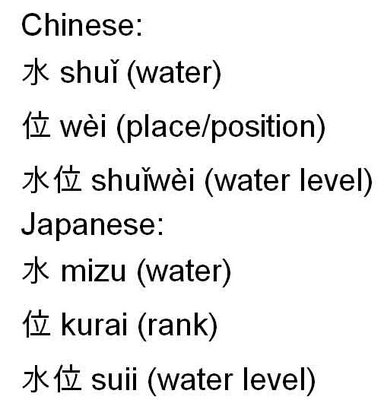
Of course sometimes, when you combine the same two characters, their meanings change. For example, huoki in Chinese means anger. Using the same characters for Japanese, you end up with kaki which stands for fire.
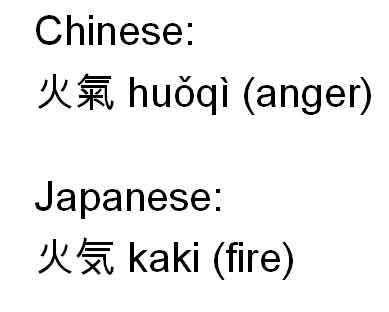
There are also situations when the Japanese kanji is supplemented by hiragana characters. For example, the character for new in Chinese is xin. In Japanese, it is atarashii, and it is comprised of a combination of kanji and hiragana.
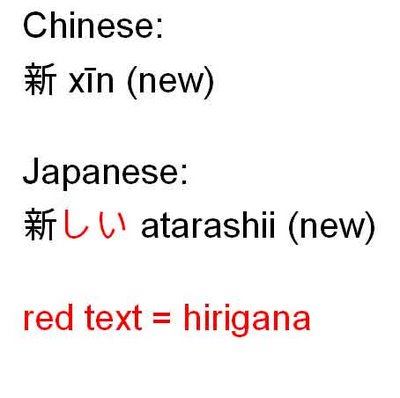
Then there’s the rare instance when the characters have been corrupted. For example, the Chinese character for book is shu. In Japanese, it’s hon. Yet these are two entirely different kanji characters. Where did the latter get its meaning? Well, hon has a Chinese equivalent. It’s pronounced as ben. It’s normally used as a unit for books. What I mean by unit is that in Chinese, in between a number and a noun is a Chinese character that’s used as a unit. In English, the closest I can think of is storm in a storm of crows or fleet in a fleet of ships. Now ben is usually a unit used to measure printed material, such as books. In Japanese, there are no such things as units. Shu still exists in Japanese, except its meaning is now penmanship rather than book.
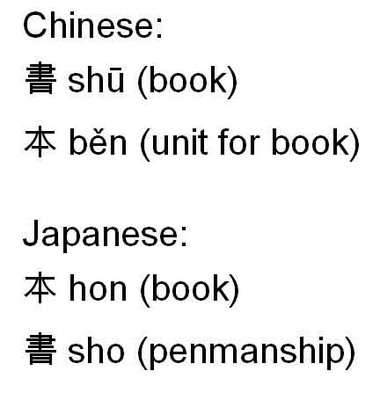
Lastly, there are more Chinese characters than Japanese kanji characters. The Japanese government has 1,945 recommended characters to be used as a guideline by the populace but that number is still dwarfed by the number of total Chinese characters. To make a long story short, there will be Chinese characters that do not exist in the Japanese language. It is harder for a Japanese person to learn Chinese compared to a Chinese person to learn Japanese (because the former supposedly has a better mastery of kanji) but the Chinese person will still need to readjust to the different meanings of words he is familiar with, not to mention grammar and syntax. A Japanese learning Chinese, on the other hand, has a lot of kanji to familiarize himself with, in addition to readjusting to the kanji he already knows.
This an attempt of mine to share my frugal knowledge on Chinese and Japanese characters. I'm tackling the two, instead of say just Japanese, because for one thing, both languages are linked to each other (or rather it's more proper to say that Japanese is linked to Chinese). Moreover, while there are several books and online webpages there that tackle Chinese and Japanese exclusively, I think it would be more interesting on my part to tackle them both and how they're related to each other.
Based on the previous lessons, one might think that just because you know Chinese you’ll automatically know Japanese (at least the kanji part) and vice versa. Unfortunately, this isn’t true. Will it be easier for you? In a way, yes, especially considering navigating through a Chinese and Japanese dictionary is the same, but I’ll get to that in the future. In the meantime, here are some significant differences.
First is the fact that both Chinese and Japanese might have the same kanji, but they’re pronounced differently. For example, in Chinese, water is pronounced as shui. In Japanese, however, it’s pronounced as mizu. However, that’s just the beginning. In Chinese, you can combine two characters to form a word with a new meaning. I call these compound words, and it’s much like English compound words. In Chinese, when you combine water with the character for location, wei, you get water level. In Japanese, the same characters can be combined to form the same meaning. However, the pronunciation becomes different in Japanese. Alone, water is pronounced as mizu, while the character that’s location in Chinese is pronounced as kurai (its meaning is also slightly different, meaning position or rank instead of a location). Combined, it merely becomes suii. It is important to note that in compound words, Chinese characters are always pronounced the same way, although their meanings can change. Japanese, on the other hand, alters in pronunciation depending on which characters it’s paired up with, as well as its meaning.

Of course sometimes, when you combine the same two characters, their meanings change. For example, huoki in Chinese means anger. Using the same characters for Japanese, you end up with kaki which stands for fire.

There are also situations when the Japanese kanji is supplemented by hiragana characters. For example, the character for new in Chinese is xin. In Japanese, it is atarashii, and it is comprised of a combination of kanji and hiragana.

Then there’s the rare instance when the characters have been corrupted. For example, the Chinese character for book is shu. In Japanese, it’s hon. Yet these are two entirely different kanji characters. Where did the latter get its meaning? Well, hon has a Chinese equivalent. It’s pronounced as ben. It’s normally used as a unit for books. What I mean by unit is that in Chinese, in between a number and a noun is a Chinese character that’s used as a unit. In English, the closest I can think of is storm in a storm of crows or fleet in a fleet of ships. Now ben is usually a unit used to measure printed material, such as books. In Japanese, there are no such things as units. Shu still exists in Japanese, except its meaning is now penmanship rather than book.

Lastly, there are more Chinese characters than Japanese kanji characters. The Japanese government has 1,945 recommended characters to be used as a guideline by the populace but that number is still dwarfed by the number of total Chinese characters. To make a long story short, there will be Chinese characters that do not exist in the Japanese language. It is harder for a Japanese person to learn Chinese compared to a Chinese person to learn Japanese (because the former supposedly has a better mastery of kanji) but the Chinese person will still need to readjust to the different meanings of words he is familiar with, not to mention grammar and syntax. A Japanese learning Chinese, on the other hand, has a lot of kanji to familiarize himself with, in addition to readjusting to the kanji he already knows.
Brand New
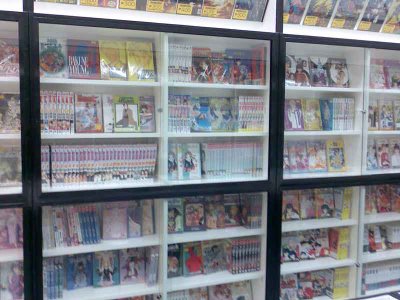

There's a certain feeling when you own a brand new item. It feels so raw, so virgin, so perfect... And more often than not, the said item will never be as good as the first time you open it from the box. In a certain way, brand new comic shops also feel like that, except on a bigger, grander scale. The place is well-organized, the displays pretty and complete, and the comic stocks haven't been touched.
The first time I've been to a sparkling brand new comic shop was during college, when CCHQ opened its doors in Katipunan. Last week, Comic Oddysey set up shop at Robinsons Galleria. I wasn't there during the opening day but I got to drop by yesterday and one could easily get mesmerized. At the center of the shop was a box of singles comics, arranged alphabetically. On the right side were displays of graphic novels and toys, arranged either by genre (I.e. X-Men), or by author (i.e. Alan Moore). To the right were various US-translated manga volumes, from the likes of Ouran to more mainstream titles like Naruto.
Anyway, I suggest you drop by during the weekend because Robinsons Galleria will be having its three-day mallwide sale, so you can discounts.
Tuesday, October 10, 2006
Whoa!

Adding to the list of toys, I mean gadgets, that I want is the HR-28 mp4 player. Aside from supporting DivX and Xvid and your standard fare mp3s, what makes it unique is probably its OS. It has a toned-down Winamp and best of all, a NES and Gameboy emulator. The only thing lacking is memory as it only has 1 GB of storage, but you can increase it via its memory card slot.
From Engadget
Pando
One of our photograhers referred to me Pando when he forgot to burn some pictures of our last pictorial. Basically, pando lets you email large files and folders via email, as high as 1 GB. Most email servers have a limit (Yahoo and Google only lets you send up to 10 MB worth of files in a single email) but Pando is a small (no more than 2 MB) P2P program that lets you download large files thanks to an email link (think of it as a .torrent file that gets sent to you via email). Tried it out on our office's Mac OS X and it works terrific, but Windows XP people can enjoy it too (sorry Linux people...).
Monday, October 09, 2006
Chinese/Japanese Characters 101: Lesson 2 Pronunciation
The language I am most familiar with, first and foremost, is English. Chinese was a subject I was taught for at least eleven years but the lessons at the time didn't seem to sink in. Japanese, on the other hand, was a language I taught myself, and it was easier for me to grasp it thanks to my prior knowledge of Chinese.
This an attempt of mine to share my frugal knowledge on Chinese and Japanese characters. I'm tackling the two, instead of say just Japanese, because for one thing, both languages are linked to each other (or rather it's more proper to say that Japanese is linked to Chinese). Moreover, while there are several books and online webpages there that tackle Chinese and Japanese exclusively, I think it would be more interesting on my part to tackle them both and how they're related to each other.
In the previous lesson, we established that Chinese and kanji characters are more like symbols rather than the phonetics common to Western languages. So how does one go about figuring how to pronounce a word?
Let’s take the kanji character for love, “ai”. In Japanese, there’s two ways to write this: in hirigana, and in kanji. Obviously, hirigana will reveal how the kanji character is pronounced. In this case, the kanji character is used more often than not, and resorting to writing ai in hirigana betrayers a person’s lack of familiarity with the language. As a learning tool, certain kanji characters are sometimes accompanied with hirigana characters written above them (and more rarely, katakana characters if the author intends to have the kanji characters pronounced in a different or foreign way). This is called hirigana and can usually be seen in books and comics designed for teenagers (or basically any printed material that’s helping the reader make the transition from hirigana to kanji).
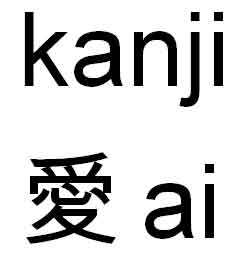
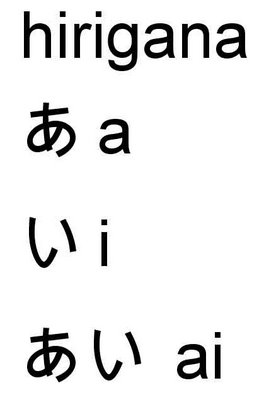
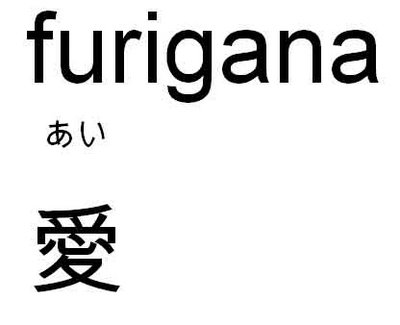
The question you might be asking is why bother with kanji at all if there’s always a hirigana equivalent for it. Well for one thing, as mentioned in the previous lesson, kanji characters speed up the reading process. The other, perhaps more important reason, is that it helps differentiate from other similar-sounding words. In English, it’s what we would call homonyms. There’s only so many letters in the Japanese alphabet and it is inevitable that certain words will be pronounced the same as other words. However, a distinct difference will be how they are written. It could be a different combination of hirigana and kanji characters or simply a different kanji character altogether. Third is the fact that kanji characters are like symbols, and kanji characters are composed of other kanji characters (I call them “root words”). Sometimes, the meaning of root words are related to the kanji character which they’re a part of. For example, in the case of ai, it contains the kanji character for heart, shin. It’s not a significant logical leap to associate heart with love.
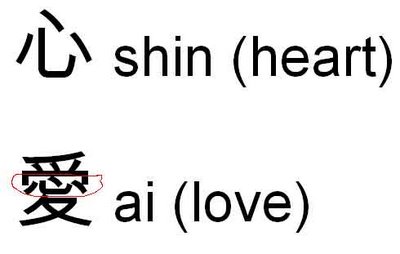
Chinese, on the other hand, poses a different problem. Unlike Japanese which has three scripts (hirigana, katakana, and kanji), it simply has one. Its entire alphabet are composed of kanji characters. So how does a Chinese person figure out how to pronounce a word?
Well, there’s zhuyin, which is a pronunciation guide for the Chinese. If the Japanese have furigana which uses hirigana to guide readers on how to pronounce a kanji character, zhuyin is the equivalent of hirigana. However, unlike hirigana, zhuyin is never used as a standalone word but simply exists to show how Chinese characters are pronounced. You can think of them as the funky pronunciation guides preceding the definition of a word in English dictionaries. You only see them when you’re interested in figuring out how a word is pronounced but aside from that, never see it used in formal texts. For each Chinese character, a zhuyin will usually comprise of one or two characters, plus an accent note. Unlike Japanese, Chinese is monosyllabic: that is, there’s only one syllable sound for each character, whereas Japanese characters range anywhere between one to three. To compensate for this lack of variety, Chinese has four accents which act to differentiate similar-sounding words. Nonetheless, Chinese still has homonyms, and either the written characters or familiarity with the usage (in the case of actual conversations) enables people to distinguish between similar sounding words.
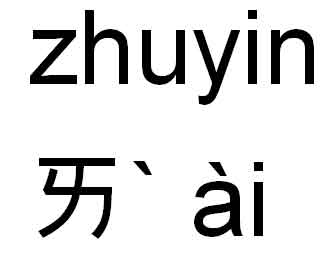
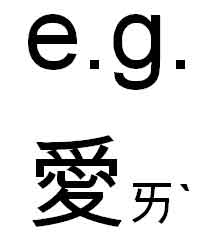
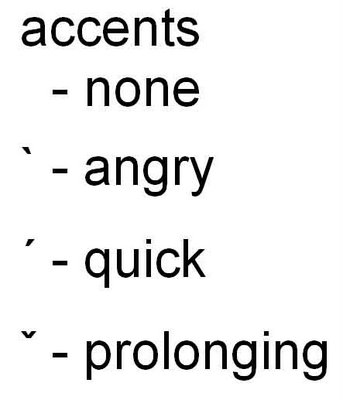
Of course if you’re an English speaker, you’ll probably be more familiar with romaji and pinyin. The former is used for Japanese, and is a guide on how to pronounce Japanese words using Roman characters. The latter is like romaji, except it’s used for Chinese characters.

This an attempt of mine to share my frugal knowledge on Chinese and Japanese characters. I'm tackling the two, instead of say just Japanese, because for one thing, both languages are linked to each other (or rather it's more proper to say that Japanese is linked to Chinese). Moreover, while there are several books and online webpages there that tackle Chinese and Japanese exclusively, I think it would be more interesting on my part to tackle them both and how they're related to each other.
In the previous lesson, we established that Chinese and kanji characters are more like symbols rather than the phonetics common to Western languages. So how does one go about figuring how to pronounce a word?
Let’s take the kanji character for love, “ai”. In Japanese, there’s two ways to write this: in hirigana, and in kanji. Obviously, hirigana will reveal how the kanji character is pronounced. In this case, the kanji character is used more often than not, and resorting to writing ai in hirigana betrayers a person’s lack of familiarity with the language. As a learning tool, certain kanji characters are sometimes accompanied with hirigana characters written above them (and more rarely, katakana characters if the author intends to have the kanji characters pronounced in a different or foreign way). This is called hirigana and can usually be seen in books and comics designed for teenagers (or basically any printed material that’s helping the reader make the transition from hirigana to kanji).



The question you might be asking is why bother with kanji at all if there’s always a hirigana equivalent for it. Well for one thing, as mentioned in the previous lesson, kanji characters speed up the reading process. The other, perhaps more important reason, is that it helps differentiate from other similar-sounding words. In English, it’s what we would call homonyms. There’s only so many letters in the Japanese alphabet and it is inevitable that certain words will be pronounced the same as other words. However, a distinct difference will be how they are written. It could be a different combination of hirigana and kanji characters or simply a different kanji character altogether. Third is the fact that kanji characters are like symbols, and kanji characters are composed of other kanji characters (I call them “root words”). Sometimes, the meaning of root words are related to the kanji character which they’re a part of. For example, in the case of ai, it contains the kanji character for heart, shin. It’s not a significant logical leap to associate heart with love.

Chinese, on the other hand, poses a different problem. Unlike Japanese which has three scripts (hirigana, katakana, and kanji), it simply has one. Its entire alphabet are composed of kanji characters. So how does a Chinese person figure out how to pronounce a word?
Well, there’s zhuyin, which is a pronunciation guide for the Chinese. If the Japanese have furigana which uses hirigana to guide readers on how to pronounce a kanji character, zhuyin is the equivalent of hirigana. However, unlike hirigana, zhuyin is never used as a standalone word but simply exists to show how Chinese characters are pronounced. You can think of them as the funky pronunciation guides preceding the definition of a word in English dictionaries. You only see them when you’re interested in figuring out how a word is pronounced but aside from that, never see it used in formal texts. For each Chinese character, a zhuyin will usually comprise of one or two characters, plus an accent note. Unlike Japanese, Chinese is monosyllabic: that is, there’s only one syllable sound for each character, whereas Japanese characters range anywhere between one to three. To compensate for this lack of variety, Chinese has four accents which act to differentiate similar-sounding words. Nonetheless, Chinese still has homonyms, and either the written characters or familiarity with the usage (in the case of actual conversations) enables people to distinguish between similar sounding words.



Of course if you’re an English speaker, you’ll probably be more familiar with romaji and pinyin. The former is used for Japanese, and is a guide on how to pronounce Japanese words using Roman characters. The latter is like romaji, except it’s used for Chinese characters.

Sunday, October 08, 2006
Chinese/Japanese Characters 101: Lesson 1 Signs and Symbols
The language I am most familiar with, first and foremost, is English. Chinese was a subject I was taught for at least eleven years but the lessons at the time didn't seem to sink in. Japanese, on the other hand, was a language I taught myself, and it was easier for me to grasp it thanks to my prior knowledge of Chinese.
This an attempt of mine to share my frugal knowledge on Chinese and Japanese characters. I'm tackling the two, instead of say just Japanese, because for one thing, both languages are linked to each other (or rather it's more proper to say that Japanese is linked to Chinese). Moreover, while there are several books and online webpages there that tackle Chinese and Japanese exclusively, I think it would be more interesting on my part to tackle them both and how they're related to each other.
Japanese has three "alphabets": hiragana, katakana, and kanji (Chinese characters). The first two is pretty much like most of the western languages. Hirigana and katakana act as pronunciation guides, and when we hear certain combination of letters used in conjunction with each other, they form the actual words which we’re familiar with. For example, "I" or "me" in Japanese is watashi. This is usually written in hiragana. It’s when we see the characters of wa, ta, and shi together that we make the mental translation of it meaning "me".
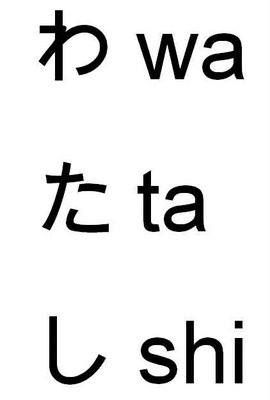
Kanji, on the other hand, doesn’t work that way. There’s no inherent guide on how to pronounce the word. Instead, it’s like signs and symbols. The closest approximation I have for Western culture is that it’s like Egyptian hieroglyphs. Chinese characters are pictograms which convey a certain meaning, depending on the characters used. For example, in Japanese, watashi also has a kanji character. However, it gives readers little insight on how it should be pronounced. However, the advantage of this is that when one is familiar with such characters, it’s faster to comprehend such words. Unlike wa-ta-shi where we process three characters to make sense of a word, the kanji of watashi is simply one character. It’s like seeing a sign on the street: we immediately know what it signifies once we catch a glimpse of it.
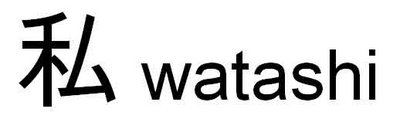
The Chinese language only uses kanji. There is no such thing as hiragana or katakana in Chinese. Japanese, on the other hand, can come in hiragana, katakana, kanji, or a combination of hiragana and kanji (there is no mixed combination of katakana and kanji).
Here are other examples of kanji characters: (Pronunciations so far have been in Japanese; the Chinese way of pronouncing them is different, and will be tackled later on.)

This an attempt of mine to share my frugal knowledge on Chinese and Japanese characters. I'm tackling the two, instead of say just Japanese, because for one thing, both languages are linked to each other (or rather it's more proper to say that Japanese is linked to Chinese). Moreover, while there are several books and online webpages there that tackle Chinese and Japanese exclusively, I think it would be more interesting on my part to tackle them both and how they're related to each other.
Japanese has three "alphabets": hiragana, katakana, and kanji (Chinese characters). The first two is pretty much like most of the western languages. Hirigana and katakana act as pronunciation guides, and when we hear certain combination of letters used in conjunction with each other, they form the actual words which we’re familiar with. For example, "I" or "me" in Japanese is watashi. This is usually written in hiragana. It’s when we see the characters of wa, ta, and shi together that we make the mental translation of it meaning "me".

Kanji, on the other hand, doesn’t work that way. There’s no inherent guide on how to pronounce the word. Instead, it’s like signs and symbols. The closest approximation I have for Western culture is that it’s like Egyptian hieroglyphs. Chinese characters are pictograms which convey a certain meaning, depending on the characters used. For example, in Japanese, watashi also has a kanji character. However, it gives readers little insight on how it should be pronounced. However, the advantage of this is that when one is familiar with such characters, it’s faster to comprehend such words. Unlike wa-ta-shi where we process three characters to make sense of a word, the kanji of watashi is simply one character. It’s like seeing a sign on the street: we immediately know what it signifies once we catch a glimpse of it.

The Chinese language only uses kanji. There is no such thing as hiragana or katakana in Chinese. Japanese, on the other hand, can come in hiragana, katakana, kanji, or a combination of hiragana and kanji (there is no mixed combination of katakana and kanji).
Here are other examples of kanji characters: (Pronunciations so far have been in Japanese; the Chinese way of pronouncing them is different, and will be tackled later on.)

Saturday, October 07, 2006
Schizo at the Funeral
I should have noticed this earlier but when it's happened three times previously, the shock factor fades into normalcy. In the hodgepodge of religions of our family, my grandfather was in a Catholic church, with a Protestant minister, and Chinese marks all over.
Friday, October 06, 2006
The Howl of Milenyo
It's late in the coming but just in case you were wondering what it was like last Thursday, cooked up in the office amidst a typhoon, you can listen to what we were hearing at the corridors of our building, mainly because one of the tenants left their windows open the day before and didn't bother coming to work (which is a wise decision). And while I do a good impersonation of howling winds, doing it consecutively for two minutes is not one of my talents.
Beam Me Up Scotty... or Just Your Data
Professor Eugene Polzik and his team from the Copenhagen University in Denmark has managed to teleport light. The implication is that still no Star Trek beaming up, but the practical uses of such a discovery is that data can be shared more efficiently and perhaps more importantly, with better safety measures against leaking it.
You can read more about it from either Scientific American or CNN.
From: Engadget
You can read more about it from either Scientific American or CNN.
From: Engadget
Thursday, October 05, 2006
Hand-Held Translator
Right now I'm basking at the irony of using a web translator to read a webpage about an audio-input translator (scroll down). Just speak into it and the device will translate Japanese into English and vice versa in real time. It's not yet at Star Trek level sophistication, but hey, we're getting there.
From Engadget
From Engadget
Nostalgia + Nickolodeon
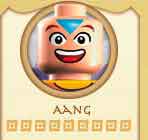
Those suffering from Avatar: The Last Air Bender withdrawal symptoms can buy themselves an early Christmas gift: Avatar-themed Lego toys
D&D Cartoon Out on DVD
Ink & Paint will be releasing the Dungeons & Dragons cartoon on DVD on December 5, 2006.
Impossible Feats
I'd post this sooner but the Internet connection at home is still unstable. Whether it can be attributed to PLDT's lousy service in general or due to the recent ravages wrought by the typhoon is best left to the reader to ponder upon.
Anyway, my New Year's resolution for this year was to read 60 books, an increase from the 52 I set for myself last year (FYI, I didn't make it last year, ending the year with having read around 40+ books). Unfortunately, by the end of September, I had just read 28 books, mainly because of a 3-month slump where I didn't really read anything, and the next few months after that has been sparse.
So in order to reach my quota, I have to read 32 books in the next 3 months. That's an average of 11 books in a month. Of course I could cheat and pick up a really thin book, but I won't do that (but I'm not picking up those really thick books either, so sorry Robert Jordan, Knife in Dreams will have to wait). I also didn't count the various graphic novels (you do know that Alan Moore's writing can be dense at times), manga (I'd have met my quota earlier if I did), comics (a single will take me around fifteen minutes?), or RPG books (which I use to make me fall asleep).
So anyone wanna take me up on a wager?
Anyway, my New Year's resolution for this year was to read 60 books, an increase from the 52 I set for myself last year (FYI, I didn't make it last year, ending the year with having read around 40+ books). Unfortunately, by the end of September, I had just read 28 books, mainly because of a 3-month slump where I didn't really read anything, and the next few months after that has been sparse.
So in order to reach my quota, I have to read 32 books in the next 3 months. That's an average of 11 books in a month. Of course I could cheat and pick up a really thin book, but I won't do that (but I'm not picking up those really thick books either, so sorry Robert Jordan, Knife in Dreams will have to wait). I also didn't count the various graphic novels (you do know that Alan Moore's writing can be dense at times), manga (I'd have met my quota earlier if I did), comics (a single will take me around fifteen minutes?), or RPG books (which I use to make me fall asleep).
So anyone wanna take me up on a wager?
D&D Ads
Starting last year, Dungeons & Dragons started coming out with ads that's equivalent to mud-slinging MMORPGs in general (yes, I know, D&D has its own MMORPG, and I'd like to point out that D&D has its own RTS as well).
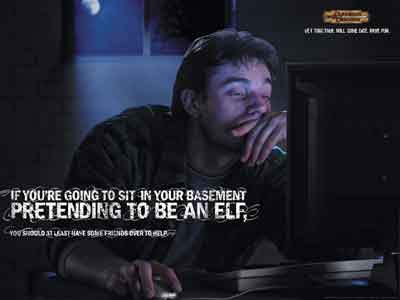
This was actually the first ad, which made its debut last year. It wouldn't be until in 2006 that the next one would come out.

So far this is my favorite ad, mostly because of the guy's expression. Either he's a good actor, or the photographer's a good art director (or maybe there's an art director involved in the shoot). In my opinion, this image is something that could only be evoked in print (it wouldn't be as effective if it were a TV commercial for example).
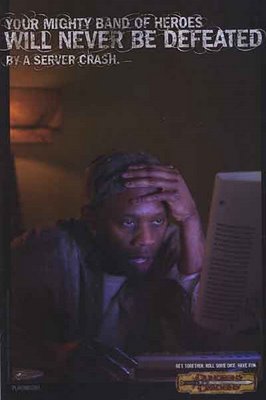
The latest one so far, it's so-so, although I'm sure everyone can relate with the message.

This was actually the first ad, which made its debut last year. It wouldn't be until in 2006 that the next one would come out.

So far this is my favorite ad, mostly because of the guy's expression. Either he's a good actor, or the photographer's a good art director (or maybe there's an art director involved in the shoot). In my opinion, this image is something that could only be evoked in print (it wouldn't be as effective if it were a TV commercial for example).

The latest one so far, it's so-so, although I'm sure everyone can relate with the message.
Wednesday, October 04, 2006
I Want!!!

The perfect complement to my Zen Vision: M, Panasonic's Word Gear e-book reader boasts a 5"6 touch screen, and with a resolution of 1024 x 600 pixels. Honestly, that's all you need to know. And I can read my manga and RPG books with it too!
From Engadget
Komikon 2006
October 21, 2006
UP Bahay ng Alumni, UP Diliman, Q.C.
10 am - 6 pm
You can find more details from their blog
Source: Gerry Alanguilan
UP Bahay ng Alumni, UP Diliman, Q.C.
10 am - 6 pm
You can find more details from their blog
Source: Gerry Alanguilan
A Mystery

I was at Fully Booked last night when I saw the box pictured above. Not that I know if there are any Fully Booked branches in North EDSA. Perhaps it's a Bibliarch branch there somewhere.
On a side note, there's a pile of water-logged A Feast for Crows paperbacks at Fully Booked Greenhills. Looks like a couple of books fell victim to the typhoon, rendering them unsellable. There are good copies available at the Rockwell branch though, in case you're interested.
Another thing worthy to add is that I have a competitor when it comes to Viz's Death Note manga. I saw the first four volumes at the Rockwell branch around a month ago but I only had money to pay for the first two. When I came back the next day, they were gone. Right now managed to snatch copies of Vol. 5-7 before my enigmatic rival buys them off the shelf.
Abducted for the Wake
So I was at home, weary, tired, and getting ready to sleep when my sister calls me to attend the wake.
The wake of my previous grandparents were all held at the same place, in the chapel of Santuario church in our village. Grandfather's wake was no different. In fact, it's really like deja vu.
Our pastor was there and it was him who held the services for the first night. During one of the previous funerals, I remember my brother mentioning that Chinese funerals were short. A few men just came in, recited some words, waved some paper with Chinese characters on them, then leaves. It doesn't take more than 10 minutes. Christian funerals, on the other hand, are long. There's usually singing, a moral for the day, and other rituals which should comfort the surviving relatives (there's comfort in following rituals after all).
Unfortunately, it's only during funerals that the English names of my grandparents are etched in my mind. For some reason, my grandmothers didn't have one. Maybe it's because the patriarchy still lingers. My father's father was Sam Yu. My mother's father was Tintin Tan.
Tintin Tan died yesterday, and it was only last Sunday that I last saw him. He was just as helpless in his bed, partially asleep, and when I greeted him, all he could do was grunt. A few months back he was rushed to the hospital. Apparently, he was rushed to the hospital last Monday for a sudden attack, and it was there that he died on Tuesday lunchtime.
The wake of my previous grandparents were all held at the same place, in the chapel of Santuario church in our village. Grandfather's wake was no different. In fact, it's really like deja vu.
Our pastor was there and it was him who held the services for the first night. During one of the previous funerals, I remember my brother mentioning that Chinese funerals were short. A few men just came in, recited some words, waved some paper with Chinese characters on them, then leaves. It doesn't take more than 10 minutes. Christian funerals, on the other hand, are long. There's usually singing, a moral for the day, and other rituals which should comfort the surviving relatives (there's comfort in following rituals after all).
Unfortunately, it's only during funerals that the English names of my grandparents are etched in my mind. For some reason, my grandmothers didn't have one. Maybe it's because the patriarchy still lingers. My father's father was Sam Yu. My mother's father was Tintin Tan.
Tintin Tan died yesterday, and it was only last Sunday that I last saw him. He was just as helpless in his bed, partially asleep, and when I greeted him, all he could do was grunt. A few months back he was rushed to the hospital. Apparently, he was rushed to the hospital last Monday for a sudden attack, and it was there that he died on Tuesday lunchtime.
Tuesday, October 03, 2006
Exhausted
In every sense of the word. Physically, emotionally, and intellectually. It's also come to the point that I don't know whether being indispensable in your job is a good thing or a bad thing. And did I mention continuous heartbreak?
End of a Generation
I was on my way to Mega Mall to look for a wire for the company's scanner when my sister called me up. It was short and brief.
"Alam mo na?" ("Have you heard the news?")
"...na?" ("What?")
"Namatay na si angkong" ("Grandfather has died.")
My grandfather on my mother's side, who was strapped to his bed the last time I saw him, with a dextrose inserted into one of his arms, was the last of my grandparents. His wife died a few years ago, a secret that the family kept from him. My grandparents on my father side died earlier. In fact, I was also at Pulp Magazine when I heard my grandfather died in the summer of 2001.
Much like of my grandparents, I never really talked to my grandfather, mostly because of the language barrier. There were attempts at bonding. I once helped him catalogue his stamp collection, but that mostly involved him giving me envelopes with stamps on them and left me alone to sort them out.
He was also very wealthy, perhaps my wealthiest relative. I wouldn't say my father married my mom for her money, but I doubt if it was for love either. I'd say it was somewhere in between, more like the traditional Chinese marriages of old. The real reason why my last name is Tan (my mother's family name) instead of Yu (my father's family name) is because of the influence my grandfather wielded, or so my father felt at the time.
Of course to me, he was a stranger. I greeted him every week and gave him the required kisses and greetings for the past twenty plus years, but that's not really enough to know a person. I have five grandparents and when three of them died (the other one died before I was born), I didn't really experience grief. It's the same feelings now.
"Alam mo na?" ("Have you heard the news?")
"...na?" ("What?")
"Namatay na si angkong" ("Grandfather has died.")
My grandfather on my mother's side, who was strapped to his bed the last time I saw him, with a dextrose inserted into one of his arms, was the last of my grandparents. His wife died a few years ago, a secret that the family kept from him. My grandparents on my father side died earlier. In fact, I was also at Pulp Magazine when I heard my grandfather died in the summer of 2001.
Much like of my grandparents, I never really talked to my grandfather, mostly because of the language barrier. There were attempts at bonding. I once helped him catalogue his stamp collection, but that mostly involved him giving me envelopes with stamps on them and left me alone to sort them out.
He was also very wealthy, perhaps my wealthiest relative. I wouldn't say my father married my mom for her money, but I doubt if it was for love either. I'd say it was somewhere in between, more like the traditional Chinese marriages of old. The real reason why my last name is Tan (my mother's family name) instead of Yu (my father's family name) is because of the influence my grandfather wielded, or so my father felt at the time.
Of course to me, he was a stranger. I greeted him every week and gave him the required kisses and greetings for the past twenty plus years, but that's not really enough to know a person. I have five grandparents and when three of them died (the other one died before I was born), I didn't really experience grief. It's the same feelings now.
More Snippets from Milenyo

Caption: Not even private subdivisions were exempt from the devastation.

Caption: The remnants of a huge billboard along EDSA.
The Milenyo weekend was definitely a unique experience. I had accustomed myself to a nomadic lifestyle, bringing with me a flashlight, a bottle of mineral water, and all the adapters for my electrical gadgets. On late Friday evening, I ventured in what used to be the crowded streets of Greenhills. Where people used to gather at the Promenade, the lone beacon of light was a McDonalds powered by a generator. Not surprisingly, I saw a lot of familiar faces there, mostly people from my high school (as well as the school opposite of it).
A batchmate who was a World of Warcraft addict was there, disconnected from his community. I told him that the street opposite of us had electricity while we didn't, and he could sympathize as his was the only house in his area that was still deprived of electricity.
An ICAn was staring at me, a girl I occassionally ran into while I was still part of the high school paper, but we never knew each other. She was probably wondering why I looked familiar; both of us didn't really age in appearance. But she was with her companions (a combination of ICAns and Xaverians), and shyness overcame us both. I actually remember her, a legacy of my stalker talents. She was the art editor of ICA's paper, Icalettes. She was at least a batch older than me, and I faintly remember her shopping at Comic Alley, buying anime merchandise as I manned the counter behind. I even remembering the shirt I was wearing back then, a black Evangelion shirt that was a birthday present from my high school friends. Maybe we'll get to meet again, maybe not.
The trip home was a dark and lonely road, figuratively and literally. I had to turn my flashlight on to safely cross the street, for it was definitely that dark. When I reached my street, most of it was still dark, but the same could not be said for the silence. There was humming, and then later, a loud booming sound. I was at the gate of actor Richard Gomez's house and even he was not exempt from the blackout. There was a large black truck parked inside his garage though, the first time I had seen such a vehicle. There was a large tube attached to it, and it was the source of the noise. Apparently they were renting a generator, the type used by film productions.
And then when I woke up Saturday morning, there was still no power, and drinkable water was limited to one pitcher. I went to Makati where the city was equally as bizzarre as my village: one half of the street had power, while the other didn't. When I reached my friend's condo, it was still running on its generator, and he told me tales of their windows barely withstanding the storm. Not everyone would be as fortunate though as a coworker witnessed her windows breaking amidst the typhoon. My brother's car has a cracked window, a victim of a McDonald sign that was blown by the wind. And I'm sure everyone else has their own stories to tell.
Monday, October 02, 2006
Quirks
I'm one of those people who prefer to read books rather than hear them. The same goes for poetry. My hearing faculties, while keen, aren't optimized to appreciate spoken words and stories. It has to do with memory. I have a greater propensity to remember what I read rather than what I hear. Unfortunately, the practice of hearing something and reading it in order to retain it in memory better doesn't work so well for me.
Another peculiarity I have is the fact that the only time I get hungry for lunch is when I actuall eat breakfast. Some days, I'm better off not eating anything, although my mind constantly fathoms the physics of such a feat.
Another peculiarity I have is the fact that the only time I get hungry for lunch is when I actuall eat breakfast. Some days, I'm better off not eating anything, although my mind constantly fathoms the physics of such a feat.
Closure
Traditional stories start with the beginning, and finish at the end. Life’s stories, however, are seldom as clean-cut, and it’s up to us to piece it all together. Who’s to say where one’s story begins, and where it ends? Does a love story simply begin when boy meets girl, or does it begin much, much farther? Perhaps it starts when he meets his first crush, or when he experiences his first heartbreak. And again, when do we end the story? When they break up? Or when they get married? Perhaps when they’re rearing their first child, or when one of them dies. Life is full of stories, but they seldom make any sense at all, at least not at first.
It’s peculiar how humans cling to the idea of a story. They want an end just as much as they want a beginning. They want closure. Yet not everything in life can be easily resolved, nor is closure the same sentiment for everyone. For a heart-broken lover, it might mean hearing from the other side that the relationship has ended and nothing as blunt or direct would do. For others, it might be the departure, the ambiguous metaphor, the implied but never confronted reality. While humans have the same needs, we express it in different ways. I’m sure you’ve heard of stories where families only get to move on when they finally see the body of a deceased relative. But there are also stories of people who adapt over time without hearing news about someone they care about. Life doesn’t tell us where a story ends and a new one begins. We determine that, although we will make up all sorts of reasons to prevent ending a finished story or worse, closing the book on an unfinished narrative.
Life isn’t linear, nor do we follow only one trail. The present is entwined with many different stories, all simultaneous, although we only pay attention to the one that is currently apparent. What might make life confusing is the fact that the stories don’t end at the same time. My role in a certain story might be finished, but another person might still have something else to contribute. And just because Story A has ended doesn’t mean Story B has, even if the former is tied to the latter. Except the stories we’re linked to is infinite, and our all too finite minds and emotions can only comprehend so much.
We have many words for closure: moving on, letting go, getting over, living for the future. It’s as essential to us as the air we breathe. However, our mistake is that we think it isn’t mutable, that once we determine where a certain story has ended that it can never be opened again. Just because old wounds have healed doesn’t mean they can’t be reopened. Sometimes revisiting the past isn’t as horrible as we make it out to be. In fact, sometimes we need to return to unfinished business so that a new story can be told. At other times, it would be convenient to move along with the present, but other people’s sense of finality deems that we experience previous trials once more, for their sake if not ours. Unlike books, real life stories don’t end with the last page. It only ends where we decide it ends, and we continually rewrite the narrative in our minds. Sometimes, the story doesn’t even end with our death, as the memories of other people contribute to the bigger story.
It’s peculiar how humans cling to the idea of a story. They want an end just as much as they want a beginning. They want closure. Yet not everything in life can be easily resolved, nor is closure the same sentiment for everyone. For a heart-broken lover, it might mean hearing from the other side that the relationship has ended and nothing as blunt or direct would do. For others, it might be the departure, the ambiguous metaphor, the implied but never confronted reality. While humans have the same needs, we express it in different ways. I’m sure you’ve heard of stories where families only get to move on when they finally see the body of a deceased relative. But there are also stories of people who adapt over time without hearing news about someone they care about. Life doesn’t tell us where a story ends and a new one begins. We determine that, although we will make up all sorts of reasons to prevent ending a finished story or worse, closing the book on an unfinished narrative.
Life isn’t linear, nor do we follow only one trail. The present is entwined with many different stories, all simultaneous, although we only pay attention to the one that is currently apparent. What might make life confusing is the fact that the stories don’t end at the same time. My role in a certain story might be finished, but another person might still have something else to contribute. And just because Story A has ended doesn’t mean Story B has, even if the former is tied to the latter. Except the stories we’re linked to is infinite, and our all too finite minds and emotions can only comprehend so much.
We have many words for closure: moving on, letting go, getting over, living for the future. It’s as essential to us as the air we breathe. However, our mistake is that we think it isn’t mutable, that once we determine where a certain story has ended that it can never be opened again. Just because old wounds have healed doesn’t mean they can’t be reopened. Sometimes revisiting the past isn’t as horrible as we make it out to be. In fact, sometimes we need to return to unfinished business so that a new story can be told. At other times, it would be convenient to move along with the present, but other people’s sense of finality deems that we experience previous trials once more, for their sake if not ours. Unlike books, real life stories don’t end with the last page. It only ends where we decide it ends, and we continually rewrite the narrative in our minds. Sometimes, the story doesn’t even end with our death, as the memories of other people contribute to the bigger story.
Sunday, October 01, 2006
50-Hour Blackout
When I woke up yesterday, we barely had any drinking water left. Eletricity returned to our house yesterday at around 3 pm, making the duration of the blackout at around 51 hours. However, I wasn't home the rest of the day to appreciate the return of electricity. The Rasberry Rapture ice cream I bought from Fruits in Ice Cream is one of the casualties from the power failiure. Of course not all is well in Metro Manila. Some places still don't have eletricity, and the surrounding area is still pretty much damaged. Clean-up of trees and other fallen debris isn't complete, and there are still some hazards, although the stormy weather has ended.
It's also interesting how Filipinos reacted to the power outage. Lots of people were in the malls, due to the fact that there's little to be done at home and that it was a payday weekend. And what an ironic payday weekend it was: malls were on sale, but the ATMs that dispensed people's salaries weren't all online. And of course, the banks were closed. Other interesting venues to note were the hotels, and if you had a smaller budget or simply desperate, the motels. Such establishments were fully booked, and families and individuals flocked there just so they can get a nice bath and an air-conditioned room to sleep in. Oh, and an interesting sight to see in the malls were how Filipinos were flocking to various Internet cafes, probably to check email, read blogs, or simply go online.
It's also interesting how Filipinos reacted to the power outage. Lots of people were in the malls, due to the fact that there's little to be done at home and that it was a payday weekend. And what an ironic payday weekend it was: malls were on sale, but the ATMs that dispensed people's salaries weren't all online. And of course, the banks were closed. Other interesting venues to note were the hotels, and if you had a smaller budget or simply desperate, the motels. Such establishments were fully booked, and families and individuals flocked there just so they can get a nice bath and an air-conditioned room to sleep in. Oh, and an interesting sight to see in the malls were how Filipinos were flocking to various Internet cafes, probably to check email, read blogs, or simply go online.
Book Buying Habits
Lately, one pattern I've noticed about my spending habits is that I'd purchase a couple of books, only to end up reading just one or two books in that pile before my next shopping spree. So yes, the books-I-have-yet-to-read stretches to infinity, although the miser in me thinks of how much I'm buying books that I don't read.
Restless
I came home at 7 am today and I've had something like six hours of sleep in between. I should be getting more rest, especially with the busy day I had yesterday, but with the blackouts that left me unproductive, I feel I have lots of nonexistent work to catch up to. I guess I'm one of those people who needs to be kept busy and doing something all the time. Is that so wrong? So anyway, here I am, tired but still awake because there's simply so much to do and so little time.
Subscribe to:
Posts (Atom)